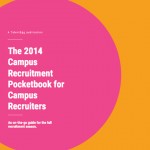Let’s face it: student and new grad job seekers will probably look at dozens – if not hundreds or even thousands – of job listings while they’re on the hunt for their dream internship, co-op, summer job or entry level job.
While some employers do a great job of optimizing their job descriptions for students and recent grads, many still don’t.
When it comes to employer branding, job descriptions seem to get overlooked time and time again.
Students’ first interaction with your employer brand
As an employer, however, it’s important to keep in mind that the information contained in your job description is an extension of your employer brand. In fact, a job description may be the first interaction a student has with your organization as they discover job opportunities on Twitter, Facebook and LinkedIn, or in the Find A Job section of TalentEgg.
The anatomy of a Gen Y-optimized job description
1. About your organization
Just in case a student or grad has come to a job listing before learning anything else about your organization, every job description you put online should include a one- or two-sentence overview of what your organization is or what it does in terms students can understand.
With the right sentence structure and word choices, you can sometimes pack in even more important, value-added information, like this great overview from Softchoice that appears at the top of their job descriptions:
Softchoice is a leading North American provider of IT solutions and services and one of Canada’s Best Workplaces™ seven years and running. With a network of more than 40 local sales offices supported by five regional call centers, we work with partners like Microsoft, HP and IBM to manage the technology needs of more than 19,000 small, mid-market, enterprise and public sector organizations.
2. Job title
Use the job title that would appear in the employee’s email signature or on their business card. However, if your organization uses job titles that are bit “outside the box,” help students understand the role better by referencing more common job titles that are synonymous with the opportunity available at your organization.
Sometimes wacky job titles can indicate that your culture is fun and innovative, but often they’re just downright confusing (and bad for search engine optimization [SEO]!).
3. Core responsibilities
Tell students what they’ll be responsible for in their role in a handful of concise bullet points or a few short paragraphs – but don’t go overboard. Job descriptions don’t need to list every single duty or task a student or new grad might do, but it is important for them to know what they’ll be held accountable for.
Unfortunately, this section is most commonly where employers go overboard with acronyms and jargon. Unless something is a household name, it doesn’t belong a student or entry level job description.
4. Minimum requirements
Many students and new grads suffer from very low professional self-esteem – they don’t think they’re qualified enough to apply for even entry level jobs.
Help them out by explaining what you really look for right in the job description:
- Education: Bachelor’s degree? College diploma? Master’s degree? Which disciplines? Be inclusive rather than exclusive to ensure students and new grads don’t count themselves out. If you’re not too picky, just say “post-secondary education.”
- Grades: If grades are important to you, say so – it’s a common misconception in many fields that employers will never look at students’ grades. If you do, mention that up front so students who are researching future career possibilities can pull up their socks and get cracking on getting As.
- Experience: One of the most common complaints from students and recent grads who submit their stories to our award-winning Student Voice project is that employers say they require a few years of experience for entry level jobs. How can they get experience if nobody will give them experience? What they may not realize, however, is that employers value internships, co-ops, summer jobs, volunteer work and extra-curricular activities as “experience.” Take the opportunity to explain exactly what you mean by “experience” if you require it. Chances are, you’ll get more qualified applicants who are more involved on-campus and in their communities.
- Attitude and culture: “Fit” has become a recruitment buzzword in the last few years, with more and more employers saying they’re simply looking for candidates who fit with the organization and its culture. Attract students and recent grads who fit by describing the attitudes that will make them most successful in the role and at your company.
5. Compensation and benefits
In my opinion, the #1 most overlooked aspect of student and entry level job descriptions is compensation and benefits. Not necessarily how much they will earn, but how their compensation will be structured and what benefits or perks they might receive for being an employee or performing well.
If we’re being realistic, new grads in particular tend to struggle with the combination of a sudden lack of support from parents and their benefits plans, and the fact that their student loan payments just kicked in. Prescription medications, glasses or contact lenses, dental check-ups and other things usually covered by benefits can become out of reach once a student completes college or university, so it’s something that can weigh heavily in favour of or against a particular employer.
Think of it as another opportunity to tell prospective candidates why they should choose you over your competitors because chances are your competitors aren’t including anything about compensation and benefits in their job descriptions!
The “Compensation” section of EF Educational Tours Canada‘s entry level job descriptions is perfect because it covers everything from salary to vacation to benefits to bonuses:
You would earn a competitive base salary, plus bonuses. You would enjoy 3 weeks of vacation in your first year with the company and 4 weeks in the second. You also would be entitled to comprehensive health and dental benefits – plus the chance to experience the products you are selling by traveling on an educational tour once a year.
Freedom 55 Financial is another great example: they are up front about the fact that their Financial Security Advisor roles are commission-based.
6. Special considerations
If you require relocation, evaluations or anything out of the ordinary, it’s in your best interest to state it up front so you don’t lose candidates throughout the recruitment and hiring process.
However, special considerations don’t always have to be “negative” – positives such as onboarding, training, travel opportunities, etc., are all fantastic perks to mention right in the job description, particularly if they are role-specific and not outlined in your more general campus recruitment or employer branding content.
Bonus: Video
On of the newest trends in Gen Y-friendly job descriptions is embedded video. This year we’ve noticed a small handful of employers who are making an effort to embed videos into their job listings in an effort to provide a more in-depth look at their organization or their career opportunities.
It’s kind of like 1. About your organization – but on steroids. If you already have a video that makes it easier to understand what you do or what it’s like for students and recent grads to start their careers with your organization, it might be worthwhile to embed it at the top of your job descriptions to better engage potential candidates as they browse for jobs. For example, while students and recent grads browse EF Educational Tours Canada’s jobs, they can also learn about “the EF experience” at the top of every job listing.
What are your best practices for writing Gen Y-friendly job descriptions? Share your tips in the comments below!






July 29, 2013 at 11:00 am
Excellent article Cassandra. I work in a college career services department and we will be sharing this on our site to guide the many small and medium size employers who post job vacancies with us.